Last Updated: 29/10/2025
Groodle (Golden Doodles) Breed Guide
Is a Groodle (Golden Doodle) right for you? Our vet guide details this popular dog's personality, size, and energy levels. Learn about their low-shedding coat, grooming needs, best food, and potential health issues like hip dysplasia.
Author: Dr Lacey Kelly BVSc (Hons)
Reading Time: 9 minutes - short read
The Groodle (also called a Golden Doodle) has become an incredibly familiar sight in Australia, shooting to popularity in recent years. Developed by crossing a Golden Retriever with a Poodle, this dog was quickly popularised for its winning combination of a fun-loving, happy personality and a low-shedding coat. Intelligent and gentle, Groodles are known for making wonderful family pets, often suiting households with allergy sufferers.
Although not an officially recognised dog breed, Groodles display consistent traits and health predispositions, making them worthy of their own profile.
All about Groodles
Place of origin
North America
Weight range
15-45kg (depends on parentage: Miniature vs Standard Poodle)
Breed size
Large
Height range
Miniature: 35-48cm, Standard: 50-70cm at shoulder
Breed group
Crossbreed 'oodle'
Life expectancy
12-15 years
Coat colours
Cream, Apricot, Gold, Caramel, Ruby, Red, Chocolate, Black
Grooming needs
Regular brushing and clipping
Coat type
Medium length with fleece or wool texture
Health issues
Allergies, hip dysplasia, elbow dysplasia
Shedding factor
Low
Exercise needs
Daily walks and play essential
Play style
Fetch, water play, puzzles,chewing
Housing needs
Adaptable if activity needs are met
Trainability
High
Social needs
Moderate
Family suitability
Excellent with all ages
Tendency to bark
Moderate
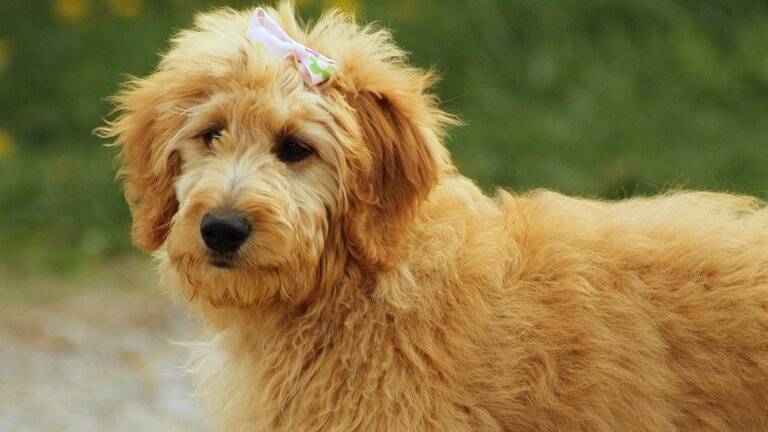
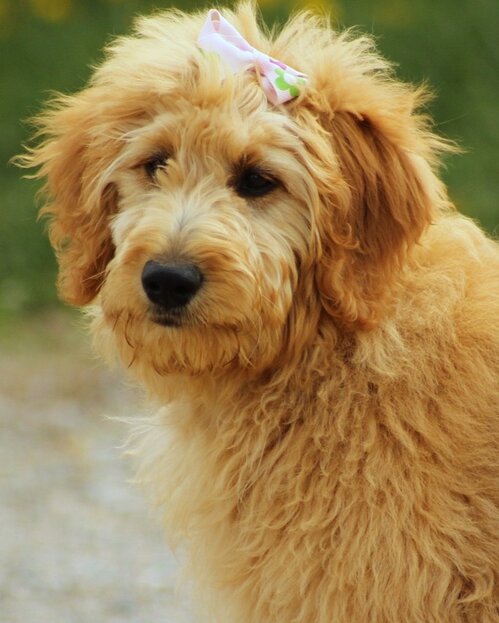
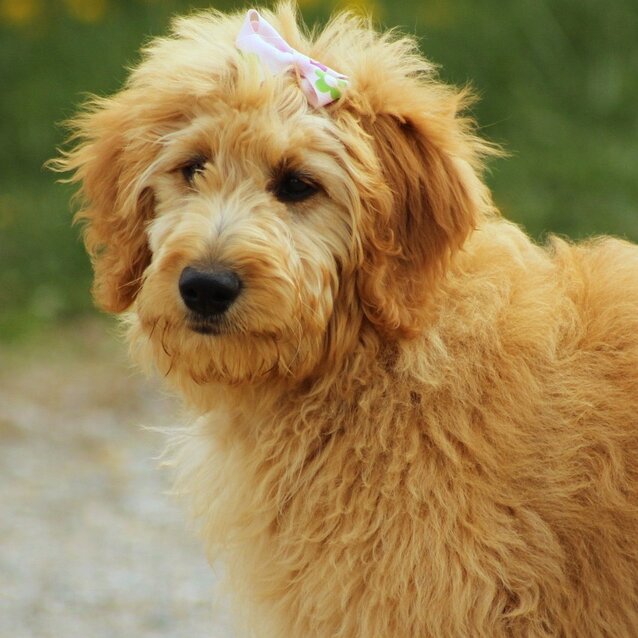
Nutrition
Feeding a high quality diet that is tailored to your Groodle's age and size will help to keep them healthy and happy. Getting nutrition right can help to prevent, reduce or manage some commonly occurring health conditions such as allergies in adults or developmental bone and joint diseases in puppies.
Best food for adult Groodles
Although there are no specific feeding requirements for an adult Groodle, it is very important that you feed a suitable premium diet. Their diet needs to be age-appropriate and meet all of their daily nutritional and energy demands. Most premium brands including Hills Science Diet, Royal Canin, or Advance are suitable. These scientifically formulated diets also contain balanced levels of protein, fat and carbohydrate plus vitamins, minerals and antioxidants for health and wellbeing.
Seeing as Groodles can inherit genetic diseases from Golden Retrievers or Poodles, it may be advisable to feed a breed specific diet. Royal Canin Golden Retriever Adult contains taurine and omega 3 to support healthy cardiac function and has an adapted calorie content to reduce obesity. Advance Adult Large Oodles has added green lipped mussel powder to support healthy joints.
What to look for
Omega 3 and 6 fatty acids for skin and joint health
Taurine and L-carnitine for heart health
Nutraceuticals such as fish oil or green lipped mussel powder for joint support
Vet picks
Best food for Groodle puppies
Groodle puppies need to eat a premium diet that is nutritionally formulated to meet AAFCO Guidelines until they are fully grown (12 months for miniature Groodles and 18 months of standard Groodles).
For standard Groodles with an expected adult weight of 25kg or over, a large-breed-specific diet is crucial, to ensure a slow, steady growth rate, and reduce the risk of orthopaedic disease.
What to look for
Balanced energy and calcium to phosphorus ratio for healthy bone development
Highly digestible formula to help prevent tummy upsets
Large-breed specific puppy food for Standard Groodles
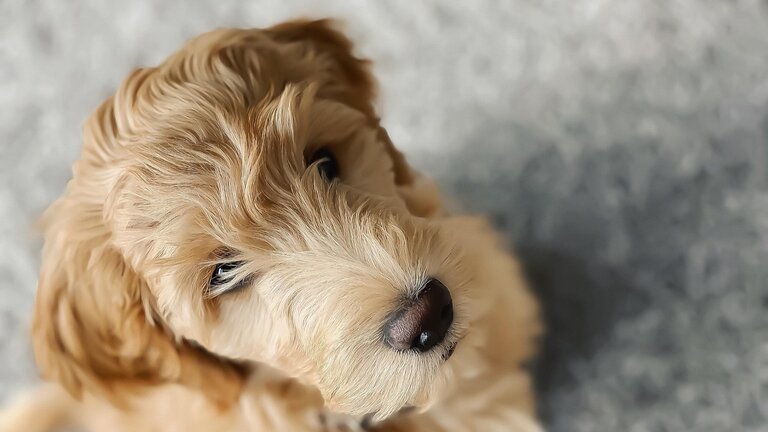
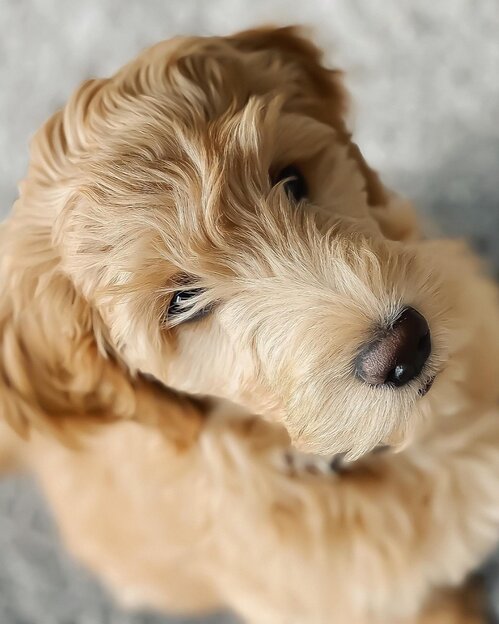
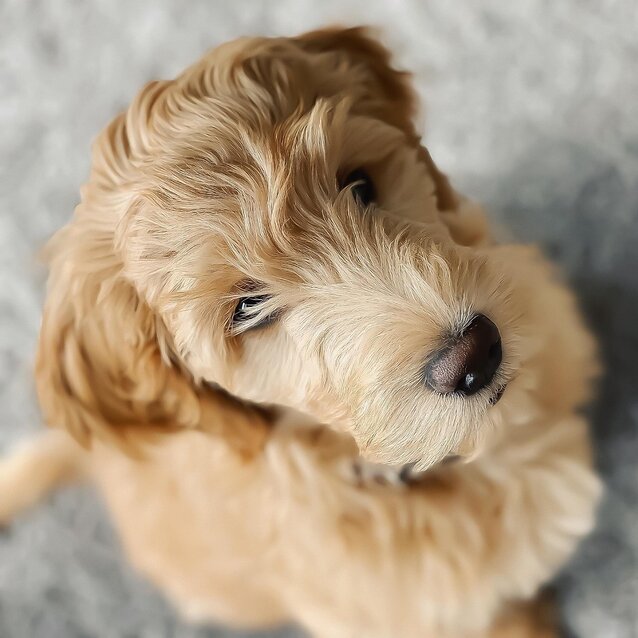
Flea & worming
Keeping your Groodle protected year round against common parasites is essential to maintaining their health. This should include coverage against fleas, ticks, heartworm and intestinal worms.
Best flea and worming treatments for Groodles
The "best" product really depends on your dog's lifestyle (such as how often they swim) and your local area's parasite risk.
Given a Groodle's thick coat - which can make ticks very hard to find and topical treatments sometimes difficult to apply - and their love of water, an oral all-in-one monthly chew is an excellent and very popular choice.
Another popular option is to combine the annual heartworm injection (given by your vet) with a monthly product that covers fleas, ticks, and intestinal worms.
What to look for
Oral chews and tablets to avoid reduced effectiveness from bathing and swimming
All in one products for simplicity
Always double check the weight range to ensure an effective dose
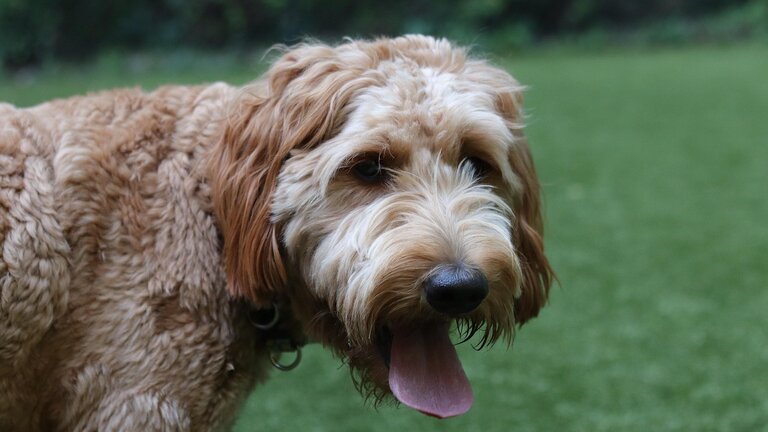
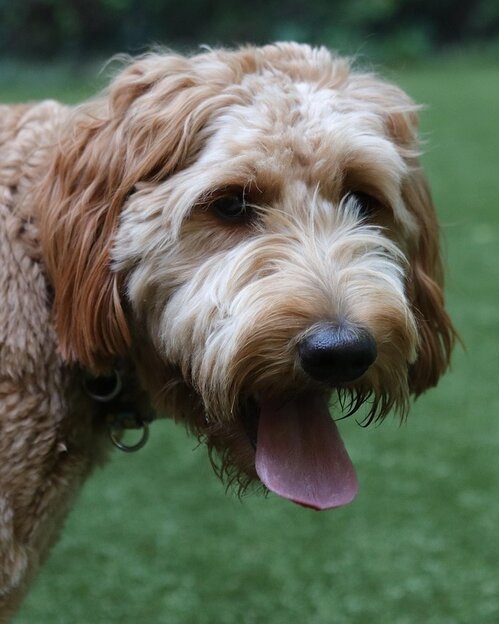
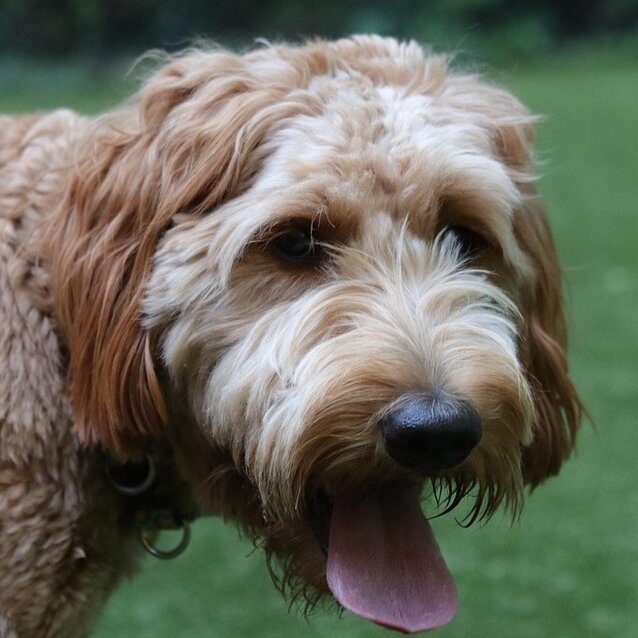
Health
Although they are a hybrid, Groodles are still prone to a number of inherited health conditions from both their Golden Retriever and Poodle parentage. Allergies, joint problems, Von Willebrand's disease (a bleeding disorder) and Addison's disease can be more common in Groodles.
Best products for allergies in Groodles
Groodles are particularly susceptible to allergies, which can be environmental (atopic dermatitis) or food-related, often resulting in itchy skin, paw licking, and recurrent ear infections.
Boosting omega-3 fatty acids, especially EPA and DHA from marine sources like fish oil, can help to calm red, itchy skin and support a stronger skin barrier. If a food allergy is suspected as the cause, a veterinarian will typically recommend an elimination diet using either a 'novel' protein (one your dog has never eaten before) or a 'hydrolysed' protein (where the protein is broken down so small the immune system doesn't react to it).
Direct skin treatments are also very helpful. Medicated shampoos, creams, or oils can soothe irritation and wash away environmental allergens. If a secondary skin infection has developed, antibacterial and/or antifungal washes will be needed. Since skin allergies and ear infections often go hand-in-hand, it is wise to clean the ears regularly to help manage any yeast or bacteria.
What to look for
Supplements rich in omega fatty acids, particularly EPA and DHA
Soothing topical washes and treatments
Hydrolysed or novel protein diets for dogs with food allergies
Best products for managing joint problems in Groodles
Joint problems like hip and elbow dysplasia are also a significant concern, especially in larger Standard Groodles. These conditions often lead to osteoarthritis (arthritis), which causes pain, inflammation, and reduced mobility.
You might notice limping after exercise, stiffness after rest, or a reluctance to use stairs or jump. If you see these signs, it's important to get a veterinary diagnosis, which may involve x-rays, and treatments such as anti-inflammatory medication.
The best approach combines therapies: maintaining a healthy weight, using joint supplements with green-lipped mussel or fish oil, and providing comfort with supportive bedding and mobility aids like ramps.
What to look for
Joint support supplements based on marine sources of omega fatty acids such as green lipped mussel powder or fish oil
Veterinary diets that provide dual support for mobility and other commonly linked issues such as weight management
Mobility support aids such as ramps, stairs and support slings
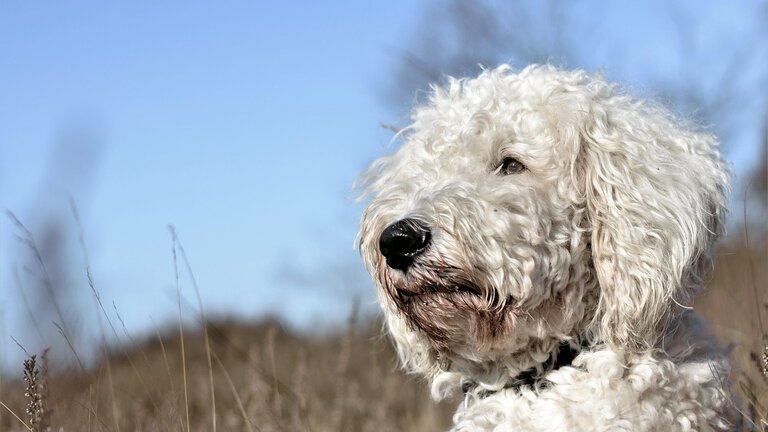
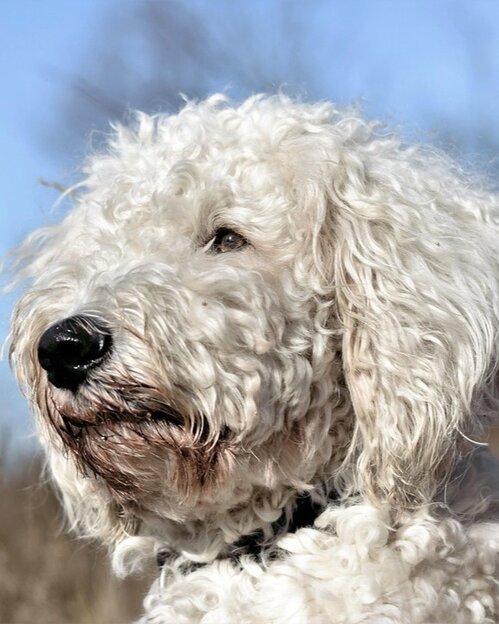
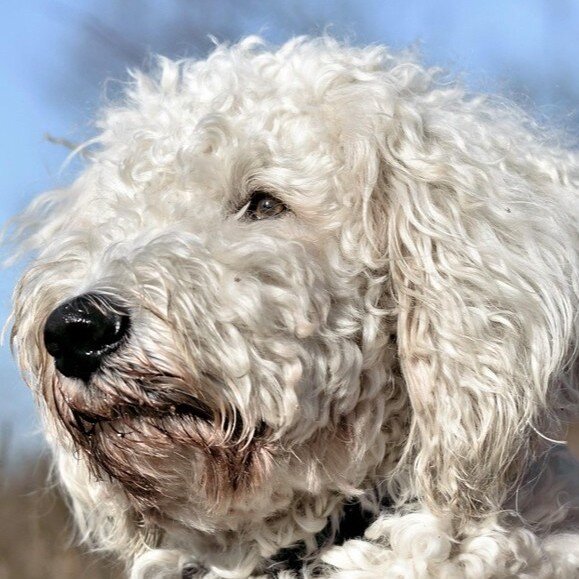
Training and activity
As a highly intelligent and energetic crossbreed, Groodles need at least an hour of daily physical activity, like brisk walks or park visits. Their sharp minds also require daily mental stimulation, so interactive puzzle toys and positive reinforcement training are essential to prevent boredom. Given their heritage, many Groodles also love to swim.
Best toys for Groodles
Groodles are intelligent, energetic balls of fluff that have an affinity for water, having inherited both the Golden Retriever and Poodle love of water. Many hours will be spent fetching floating water toys from the beach or pool. These furry sweethearts can also be destructive chewers, so it is a good idea to keep a stockpile of durable toys on hand.
What to look for
Water and fetch toys to satisfy retriever instincts
Food dispensing toys and puzzles to slow down mealtime and reduce boredom
Durable chew and tug toys
Best harnesses, collars and walking accessories for Groodles
A well-fitting harness is often the best choice for walking your active Groodle, especially for puppies still learning their loose-leash manners. A front-attaching harness provides better control for this energetic dog without putting strain on the neck. To ensure comfort and help prevent matting, look for padded styles. While a harness is ideal for walks, a flat collar is still essential for holding ID tags. Complete your kit with a sturdy leash and a treat pouch, which is perfect for rewarding good behaviour in this intelligent and food-motivated dog.
What to look for
Front attaching harness to provide better control and reduce neck strain
Flat collar for ID tags
Bite sized, high value treats and a treat pouch for training on the go
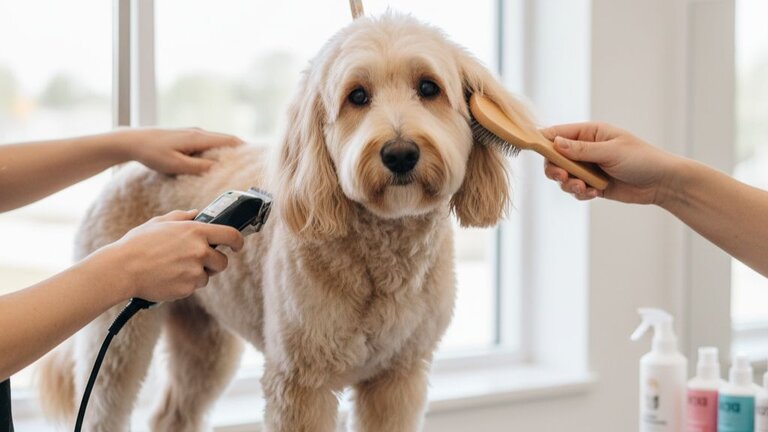
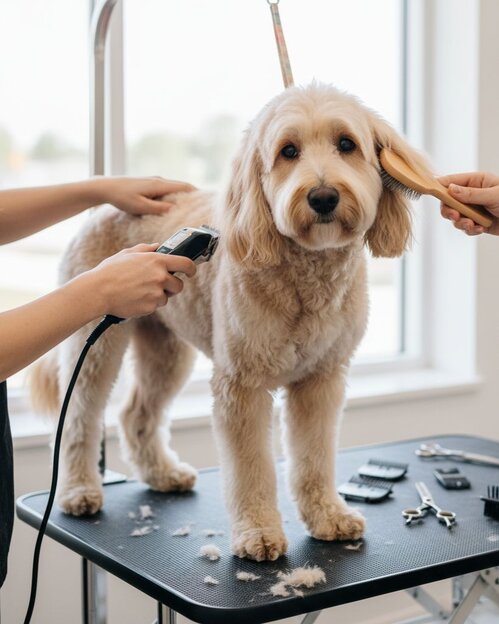
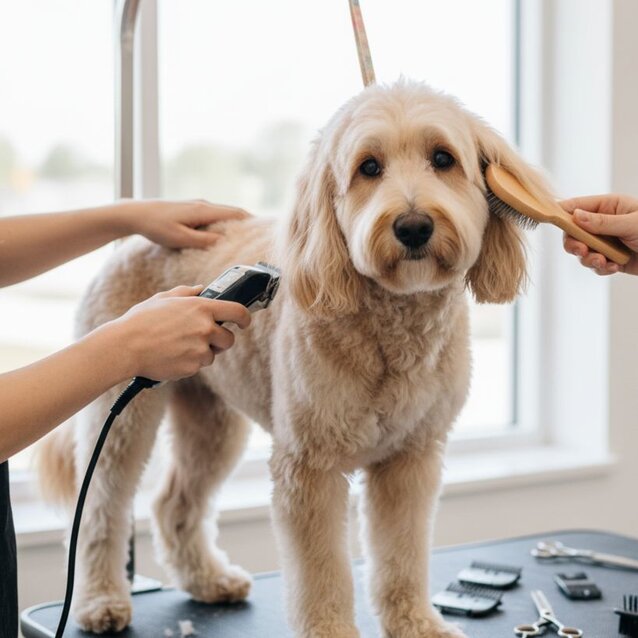
Grooming
Groodles are a high-maintenance dog in terms of grooming. Their coats are prone to matting and require regular, thorough brushing at home several times a week. They also need to be bathed and often professionally clipped to keep their coat healthy and tangle-free.
Best grooming products for Groodles
There are three types of coats Groodles can have, and all require regular brushing (especially behind the ears, around the mouth and the tail plume) which can take 1-2 hours a week. It is recommended that Groodles with any coat type are bathed regulary and clipped by a groomer every 6-8 weeks to avoid painful matting.
Flat coats: Flat or straight coats are similar to that of a Golden Retriever, and are the most likely to shed. They require regular brushing (at least weekly) to remove any loose fur.
Fleece coats: Fleece coats are soft and silky and can be wavy or straight. They require brushing 1-2 times per week to ensure they don't become matted.
Wool coats: The wool or curly coat is more dense like that of a poodle and is the least likely coat type to shed. This coat type also requires regular brushing to prevent matting and tangling.
It is important to start the grooming process when Groodles are puppies, so they get used to the regular brushing, bathing and clipping needed for coat upkeep.
Along with brushing and clipping, Groodles need regular baths. When they are puppies, it is best to use a puppy shampoo on their sensitive skin. For adult Groodles, a soothing shampoo like Aloveen or Dermcare are great for keeping their coats shiny and soft.
What to look for
Gentle ear cleaners to for use after bathing and swimming
Slicker brushes, and metal combs for regular brushing
Shampoos and conditioners that support a healthy skin barrier
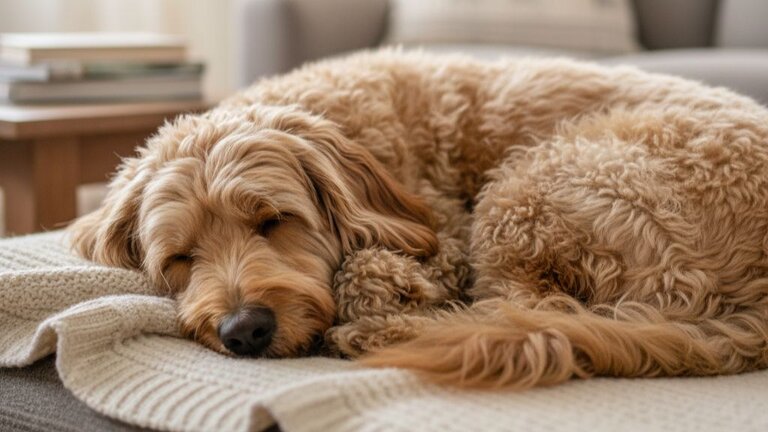
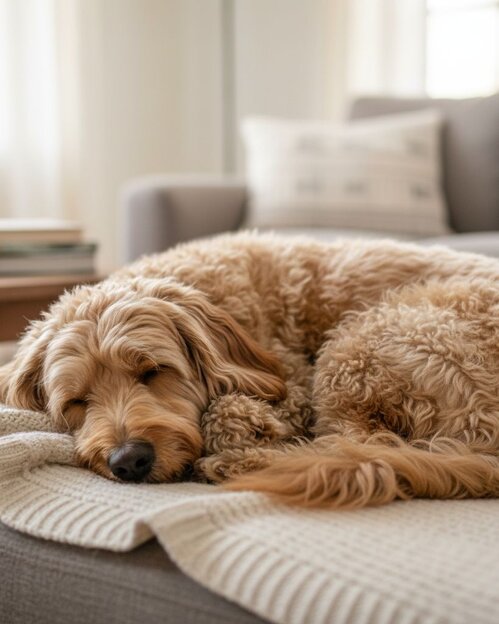
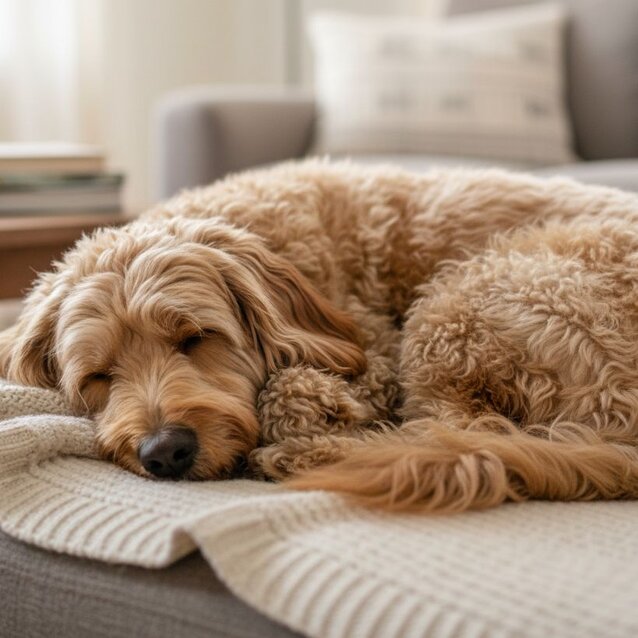
Sleep and home
Like most adult dogs, Groodles generally need about 12-14 hours of sleep per day, although this can be much more for puppies (up to 18-20 hours). As an active and social dog, your Groodle will need a comfortable and supportive bed to recover after a big day of play.
Best beds for Groodles
Given their propensity for joint issues like hip and elbow dysplasia, an orthopaedic or memory foam bed is an excellent investment, especially for larger Standard Groodles. To help manage their high-maintenance coat and any potential skin allergies, a bed with a removable, machine-washable cover is essential for hygiene. Many Groodles also appreciate 'bolster' or 'cuddler' beds with raised sides, which can help them feel safe and secure.
What to look for
Extra support for joints from orthopaedic or memory foam
Durable, machine washable covers
Medium to extra large size depending on your dog's measurements

